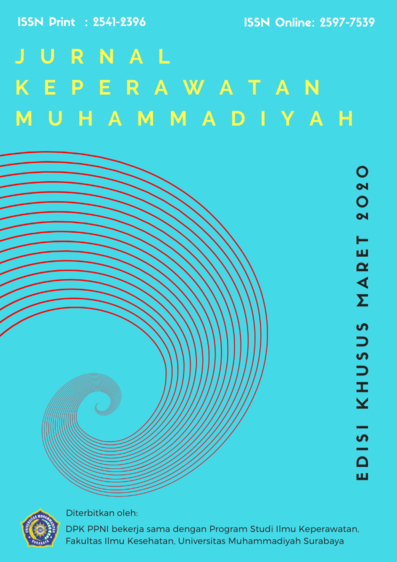Pengalaman, Dampak, Dan Strategi Untuk Mengatasi Moral Distress Perawat : Systematic Review
DOI:
https://doi.org/10.30651/jkm.v5i2.3806Keywords:
Moral distress, moral conflict, moral problems, nursesAbstract
Objective: Moral distress is a problem that is often overlooked in the nursing profession which is a painful psychological imbalance that results from knowing ethically appropriate actions, but cannot do it. The purpose of this systematic review is to thoroughly investigate the experience of nurses' moral distress and the range of impacts that they cause and the strategies for overcoming moral distress to nurses.
Method: Literature search on electronic databases from journals that have been published through ProQuest, PubMed, ScienceDirect, and Google Scholar from January 1, 2010, to September 1, 2019.
Results: The intensity and frequency of moral distress experienced by nurses tend to vary. This result is due to differences in individual characteristics as well as workplace characteristics, duties, and responsibilities. The impact caused by moral distress very much includes the deterioration of the physical and mental health of nurses, provision of care, job satisfaction, and unsustainable care, poor communication, limited patient advocacy, lack of care, decreased job satisfaction, burnout and increased nursing turnover. Strategies that can be done to overcome the problem of moral distress are the application of adaptation models and individual approaches and collaborative approaches by providing ethical education to nurses and professionals in hospitals.
Conclusion: Moral distress has many negative effects on both the nurse, patient and the quality of nursing care. Various strategies can be applied to overcome the problems of moral distress experienced by nurses, namely the adoption of adaptation models and individual approaches and collaborative approaches by providing ethical education to nurses and professionals in hospitals.
Keywords: Moral distress, moral conflict, moral problems, nurses.
References
American Association of Critical Care Nurse (AACCN). (2004). The 4A ’ s to Rise Above Moral Distress.
Badolamenti, S., Fida, R., Zaghini, F., Caruso, R., Sili, A., & Biagioli, V. (2017). Modified Moral Distress Scale ( MDS-11 ): Validation. Professioni Infermieristiche, 70(4), 240–250. https://doi.org/10.7429/pi.2017.704238.
Barlem, Lunardi, Lunardi, Dalmolin, & Tomaschewski. (2012). The experience of moral distress in nursing: the nurses’ perception *. Scielo, 46(3), 678–685. https://doi.org/http://dx.doi.org/10.1590/S0080-62342012000300021
Burston, & Tuckett. (2012). Nursing Ethics. Nursing Ethics, 20(3), 312–324. https://doi.org/10.1177/0969733012462049
Christodoulou-fella, Middleton, Papathanassoglou, & Karanikola. (2017). Exploration of the Association between Nurses ’ Moral Distress and Secondary Traumatic Stress Syndrome : Implications for Patient Safety in Mental Health Services. Hindawi, 20(17), 1–20. https://doi.org/https://doi.org/10.1155/2017/1908712
Corley. (2002). N Urse M Oral D Istress : A Proposed Theory And Research Agenda. Nursing Ethics, 9(6), 636–650. https://doi.org/10.1191/0969733002ne557oa
Corley, Elswick, Gorman, & Clor. (2001). Development and evaluation of a moral distress scale. Journal of Advanced Nursing, 33(2), 250–256. https://doi.org/10.1046/j.1365-2648.2001.01658.x
Deady, & Mccarthy. (2010). Nurses Experiencing Moral Distress. Psychiatric Care, 46(3), 209–220. https://doi.org/10.1111/j.1744-6163.2010.00260.x
Julian PT Higgins & Sally Green. (2008). Cochrane Handbook for Systematic Reviews of. (J. P. H. and S. Green, Ed.). USA.
Lazzarin, Biondi, & Mauro. (2014). Nursing Ethics Moral distress in nurses in oncology and haematology units. Nursing Ethics, 19(2), 183–195. https://doi.org/10.1177/0969733011416840
Maluwa, Andre, Ndebele, & Chilemba. (2012). Nursing Ethics practice in Malawi. Nursing Ethics, 19(2), 196–207. https://doi.org/10.1177/0969733011414968
Mealer, M., & Moss, M. (2016). Moral distress in ICU nurses. Intensive Care Medicine, 42(10), 1615–1617. https://doi.org/10.1007/s00134-016-4441-1
Moher, D., Liberati, A., Tetzlaff, J., Altman, D. G., Altman, D., Antes, G., … Tugwell, P. (2009). Preferred reporting items for systematic reviews and meta-analyses: The PRISMA statement. PLoS Medicine, 6(7). https://doi.org/10.1371/journal.pmed.1000097
Oh, & Gastmans. (2015). Moral distress experienced by nurses : A quantitative literature review. Nursing Ethics, 22(1), 15–31. https://doi.org/10.1177/0969733013502803
Pauly, Varcoe, Storch, & Newton. (2009). Nursing Ethics Registered Nurses ’ Perceptions of Moral Distress and Ethical Climate. Nursing Ethics, 16(5), 2–14. https://doi.org/10.1177/0969733009106649
Schaefer, Zoboli, & Vieira. (2018). Moral Distress In Nurses : A Description Of The Risks For Sofrimento Moral Em Enfermeiros : Descrição Do Risco Para. Texto Contexto Enferm, 27(4), 1–10. https://doi.org/http://dx.doi.org/10.1590/0104-07072018004020017 Original
Schluter, Winch, & Holzhauser. (2008). N URSES ’ M ORAL S ENSITIVITY AND H OSPITAL E THICAL C LIMATE : A LITERATURE REVIEW. Nursing Ethics, 15(3), 304–321. https://doi.org/10.1177/0969733007088357
Shorideh, Ashktorab, & Yaghmaei. (2012). Iranian intensive care unit nurses ’ moral distress : A content analysis. Nursing Ethics, 19(4), 464–478. https://doi.org/10.1177/0969733012437988
Silva. (2015). Moral Distress. Rhode Island College.
Thomas, T. A., & Mccullough, L. B. (2015). A Philosophical Taxonomy of Ethically Significant Moral Distress. Journal of Medicine and Philosophy, 49, 102–120. https://doi.org/10.1093/jmp/jhu048
triana harlia putri. (2016). Hubungan Moral Distress dengan Burnout pada Perawat yang Praktik di Rumah Sakit Jiwa Dr. Soeharto Heerdjan Jakarta. Retrieved from http://scholar.unand.ac.id/13155/1/ABSTRAK.pdf
Xiaoyan, Yufang, Lifeng, & Congcong. (2016). Moral distress and its influencing factors : A cross- sectional study in China. Nursing Ethics, 1–11. https://doi.org/10.1177/0969733016658792
Downloads
Published
Issue
Section
License
- Penulis tetap memegang hak atas karyanya dan memberikan hak publikasi pertama kepada jurnal ini yang secara simultan karya tersebut dilisensikan di bawah:Â Creative Commons Attribution-ShareAlike 4.0 International (CC BY-SA 4.0)













